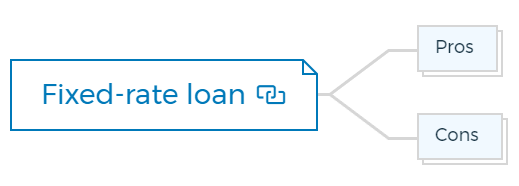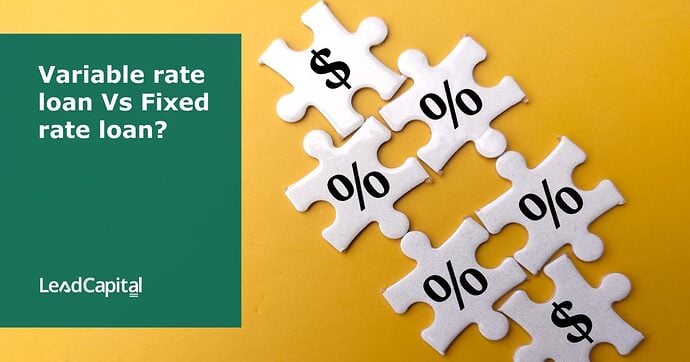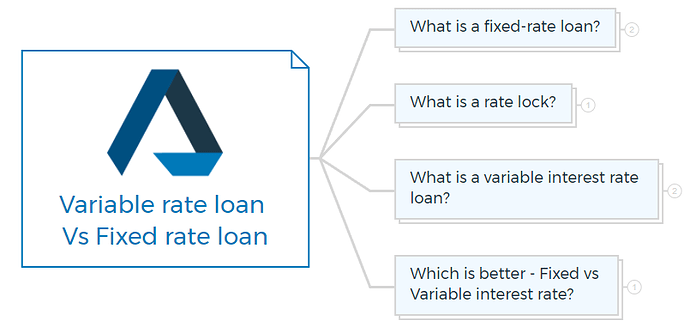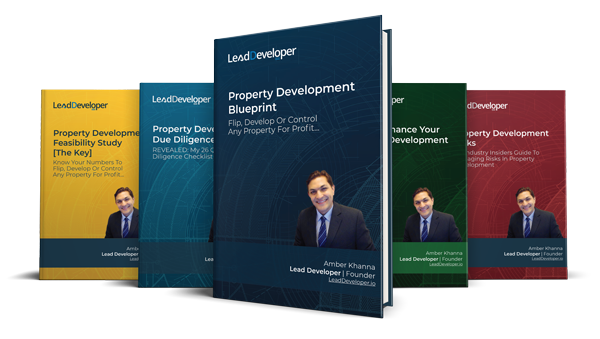Variable rate loan Vs Fixed rate loan?
Fixed vs variable interest loan is a crucial decision for borrowers.
Fixed-rate loans are better suited to those who want financial security and predictability. In contrast, variable-rate loans can provide more flexibility and be more cost-effective in the long run.
What is a fixed-rate loan?
Fixed-rate loans are loan agreements that charge borrowers a predetermined interest rate for the duration of the loan. Fixed-rate loans are popular among borrowers who want to know exactly how much they’ll be paying on their loan during the repayment period.
Fixed interest rates can range from six months to 30 years and offer a lower risk of interest rate fluctuations.
Break charges may apply if you pay off or refinance your home loan before the set term. These may be large amounts.

Pros -
- You may confidently plan for the future and establish financial objectives.
- You may specify the length of time you want to set your interest rate.
- A rise in the interest rate may not impact you.
Cons -
- Fixed-rate loans may prohibit further repayments or cap them at a specific amount each year, limiting borrowers’ debt repayment speed.
- Over the fixed period, borrowers can’t withdraw cash or connect an offset account.
You applied and are awaiting settlement. You check the papers and find that your competitive fixed interest rate has increased. You’re trapped into the loan for the fixed term, and your monthly payments are more than expected.
Locking in the fixed rate is a foolproof way to avoid falling into this trap.
You are missing out if you haven’t yet subscribed to our YouTube channel.
What is a rate lock?
Rate locking is an agreement between a borrower and a lender in which the lender agrees to lock in a specific interest rate for a specified period.
Locking in interest rates guarantees that the loan won’t be affected by a change in interest rates during the specified period, allowing borrowers to secure a fixed-rate loan even if interest rates change before their loan closes.

How do you lock in your interest rate?
Before owning a property, most individuals look for a good loan with reasonable interest rates. They need to realise they get the loan’s interest rate, not the rate they applied for.
Rate locking usually comes with a fee, but it offers borrowers the peace of mind that they won’t be affected by any changes in interest rates. Rate locks can range from free to up to 0.2% of the loan amount, depending on the lender.
For example - A bank offers a 7% fixed interest rate house loan. Before settlement, this rate might be 7.5% or 5%. If you don’t rate lock your loan, you’ll get the interest rate when it’s advanced.
With a rate lock, most lenders would let you have the lower rate if it dropped to 5%, but if it rose to 7.5%, you would pay only 7%.
What is a variable interest rate loan?
Variable interest rate loans are loan agreements that charge borrowers an interest rate that can change throughout the repayment period.
A variable loan’s interest rate is tied to an index, such as the prime lending rate, which reflects changes in market conditions and other economic factors. As a result, the interest rate and monthly payments on a variable-rate loan may fluctuate during repayment.

Pros -
- When the interest rate falls, loan repayments go down.
- Variable rate loans offer more repayment alternatives, including speedier repayment without interest rate break costs.
- If you’re on a variable rate, switching lenders or home loans may be easier if you find a better deal.
Cons -
- Interest rate uncertainty makes budgeting difficult.
- You may need to pay more if interest rises.
- Borrowers with variable rates will find it harder to estimate long-term cash flow.
Property Development Books - “Starter-Pack”
18 Property Development Books To Get You Started Now
Includes 18 x detailed eBooks
✓ Property Development Checklist - 6 Pages
✓ How To Finance Your Property Development Project? - 13 Pages
✓ Property Development Team - 19 Pages
✓ Site Acquisition Process - 14 Pages
✓ The Ultimate Guide To Getting Started In Property Development - 42 Pages
✓ My Secret Property Development Process - 28 Pages
✓ How To Nail Your Next No Money Down Deal? - 29 Pages
✓ Industry Insiders Guide To Managing Risks In Property Development - 26 Pages
✓ How To Become A Property Developer? - 41 Pages
✓ Do You Have What It Takes To Be A Property Developer? - 12 Pages
✓ 7 Common Mistakes Made By Property Developers & How To Avoid Them? - 12 Pages
✓ 5 Reasons, Buy & Hold Property Investors Fail At Property Development - 16 Pages
✓ 10 Financial Mistakes Made By Property Investors & Developers - 54 Pages
✓ My 26 Question Due Diligence Checklist - 21 Pages
✓ Property Development 101: The Feasibility Study - 34 Pages
✓ Property Development 101: Construction Guide - 55 Pages
✓ Property Development Blueprint - 66 Pages
✓ Your Definitive Guide To Property Options - 36 Pages
Which is better - Fixed vs Variable interest rate?
Your loan type will depend on your financial goals and risk tolerance.
Fixed-rate loans offer security in knowing that your interest rate won’t change over time, while variable-rate loans offer the potential for more favorable rates during market downturns.
Fixed-interest rate loans may appeal to real estate investors who are not interested in paying off their loans early and prefer fixed-rate repayments.
Borrowers who plan to refinance, remodel, or sell their homes in the near future may prefer a variable interest rate.
Learn More
Can’t decide? Choose to split your home loan
If you can’t decide between a fixed-rate and a variable-rate loan, you should try taking out both. In this case, you’ll take out a fixed-rate loan for a certain sum and a variable-rate loan for another.
This will allow you to prepay the portion of your loan with a variable interest rate without penalty while maintaining the stability of the loan’s fixed interest rate portion.
This option is best for first-home buyers with less equity in their homes.
Property Finance Made Easy
We specialise in Development funding | Commercial finance | Construction loans | Portfolio refinancing & Property investment loans in Australia.
Click Here to strategise with Amber





